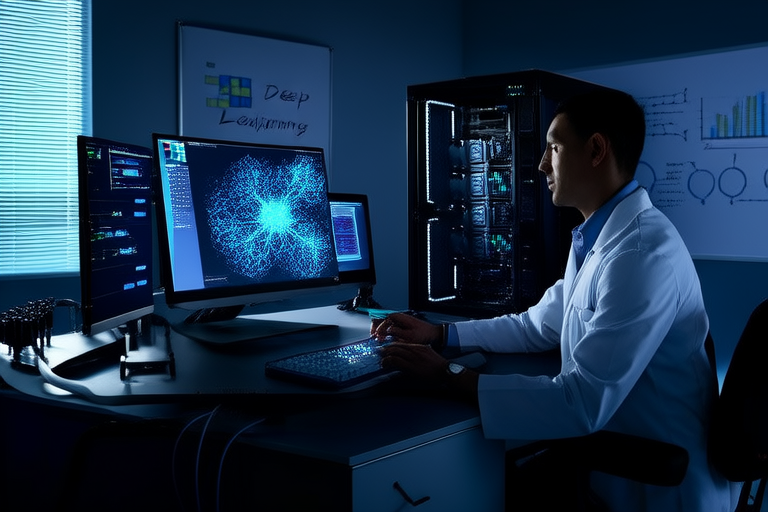“`html
The Impact of Deep Learning on Modern Technology Trends
Deep learning, a subset of artificial intelligence (AI) and machine learning (ML), has emerged as a powerful tool that is reshaping the technological landscape. It involves training neural networks with large datasets to recognize patterns and make decisions. This advanced form of machine learning has transcended traditional methods, enabling more accurate predictions and complex problem-solving capabilities.
Deep learning has evolved significantly from its roots in classical machine learning techniques, which often relied on simpler algorithms and smaller datasets. The introduction of neural networks, particularly those with multiple layers (hence ‘deep’), has allowed for more sophisticated models capable of handling vast amounts of data. This evolution has been pivotal in unlocking new possibilities across various industries.
Historical Context
The journey of deep learning began in the late 1950s with the development of perceptrons, the earliest form of neural networks. However, it wasn’t until the 2000s that significant breakthroughs occurred, driven by advancements in computing power, improved algorithms, and access to large datasets. Key milestones include Geoffrey Hinton’s work on backpropagation and dropout techniques, Yoshua Bengio’s contributions to word embeddings, and Yann LeCun’s pioneering efforts in convolutional neural networks (CNNs).
Pioneers like Andrew Ng, Fei-Fei Li, and Demis Hassabis have played instrumental roles in popularizing and advancing deep learning. Their contributions have paved the way for practical applications that are now transforming industries worldwide.
Applications in Various Industries
Healthcare
In healthcare, deep learning is revolutionizing diagnostics through image analysis, enabling earlier and more precise detection of diseases like cancer. It also supports personalized medicine by analyzing genetic data to tailor treatments. Additionally, deep learning accelerates drug discovery by predicting molecular interactions and identifying potential therapeutic compounds.
Automotive Industry
The automotive industry leverages deep learning for autonomous driving technologies. Advanced systems use CNNs to process camera feeds, LIDAR, and radar data to navigate safely. Despite challenges such as ensuring safety and reliability, continuous advancements in sensor fusion and real-time decision-making are pushing the boundaries of what autonomous vehicles can achieve.
Finance
Deep learning enhances financial services through fraud detection, algorithmic trading, and risk assessment. By analyzing transaction patterns and market data, these systems can identify anomalies indicative of fraudulent activities or predict market movements for optimized trading strategies.
Retail
Retailers employ deep learning for customer behavior analysis, enhancing recommendation systems, and improving inventory management. These tools help businesses understand consumer preferences, optimize product offerings, and streamline operations for better efficiency.
Manufacturing
Deep learning impacts manufacturing through predictive maintenance, quality control, and supply chain optimization. Predictive models anticipate equipment failures, reducing downtime, while quality control systems ensure consistent product standards. Supply chain optimizations enhance logistics and reduce costs.
Technological Advancements Enabled by Deep Learning
Deep learning has catalyzed innovations in natural language processing (NLP), computer vision, robotics, and speech recognition. NLP enables machines to understand and generate human language, facilitating chatbots, translation services, and sentiment analysis. Computer vision powers facial recognition, object detection, and augmented reality. Robotics benefits from improved motor skills and perception, while speech recognition enhances voice assistants and telecommunication systems.
Recent breakthroughs, such as transformer architectures and generative adversarial networks (GANs), promise further advancements in these domains. These developments underscore the potential for deep learning to continue shaping the future of technology.
Challenges and Ethical Considerations
Implementing deep learning solutions comes with challenges, including data privacy concerns, algorithmic bias, and interpretability issues. Ensuring robust data protection measures is critical, especially given the sensitive nature of the data involved. Bias in algorithms can perpetuate existing inequalities, necessitating careful validation and testing. Interpretability remains a hurdle, as many deep learning models function as ‘black boxes,’ making it difficult to understand their decision-making processes.
Ethical considerations demand attention, with calls for transparent and accountable AI systems. Regulatory frameworks must evolve to address these issues, ensuring responsible deployment of deep learning technologies.
Future Outlook
The future of deep learning holds exciting prospects, with ongoing research exploring areas like explainable AI, federated learning, and reinforcement learning. These advancements could lead to more transparent and efficient systems. Emerging fields, such as quantum computing and neuromorphic engineering, may further expand the capabilities of deep learning, enabling even more sophisticated applications.
As deep learning continues to evolve, it will likely play a pivotal role in addressing global challenges, from climate change to healthcare disparities. Its potential to drive innovation across sectors is immense, promising a transformative impact on society.
Conclusion
Deep learning has profoundly influenced modern technology trends, driving advancements in healthcare, automotive, finance, retail, and manufacturing. Its applications span a wide array of domains, from NLP and computer vision to robotics and speech recognition. While challenges remain, the transformative power of deep learning is undeniable, offering unprecedented opportunities for innovation and progress.
As we look ahead, the continued evolution of deep learning promises to shape the future of technology, addressing pressing global issues and unlocking new frontiers of possibility.
“`




